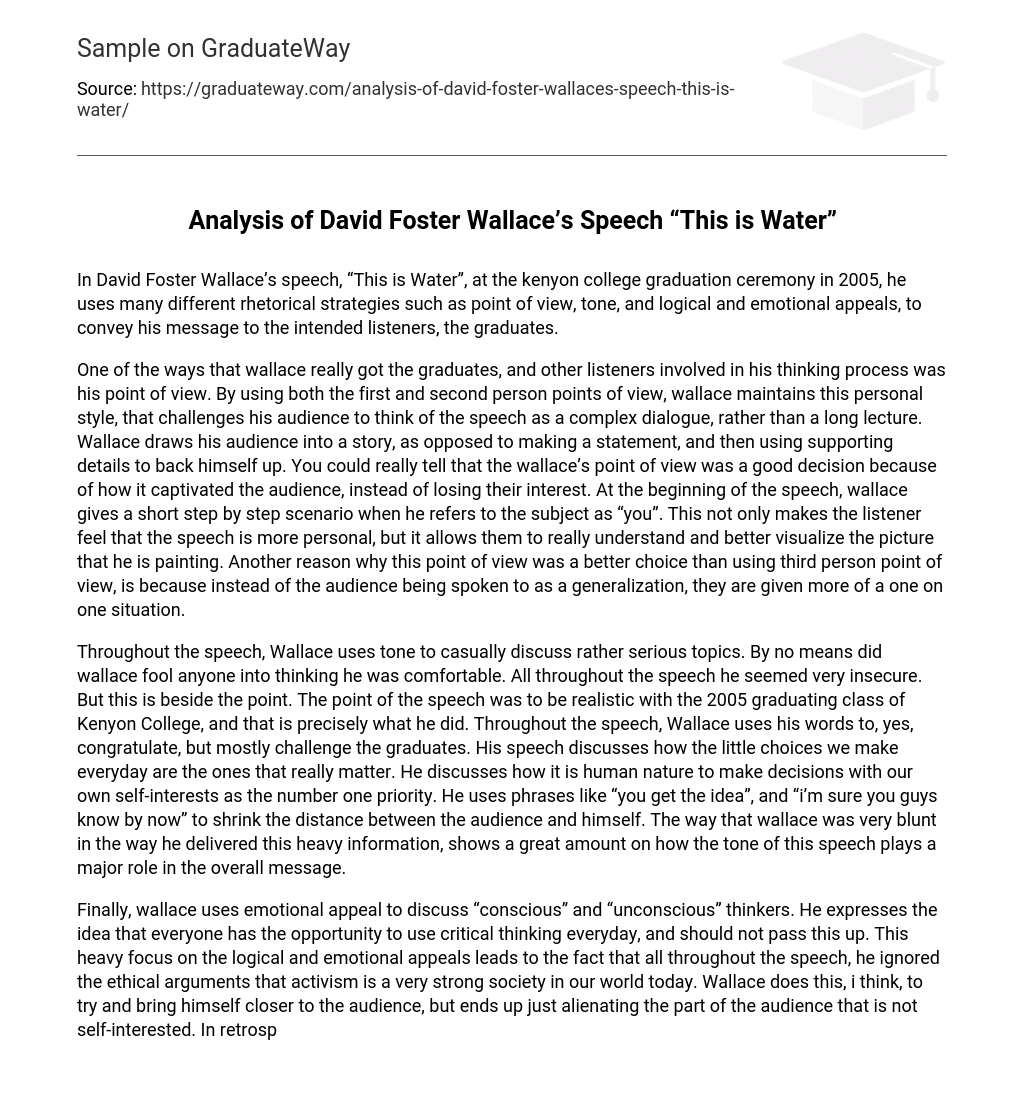In David Foster Wallace’s speech, “This is Water”, at the kenyon college graduation ceremony in 2005, he uses many different rhetorical strategies such as point of view, tone, and logical and emotional appeals, to convey his message to the intended listeners, the graduates.
One of the ways that wallace really got the graduates, and other listeners involved in his thinking process was his point of view. By using both the first and second person points of view, wallace maintains this personal style, that challenges his audience to think of the speech as a complex dialogue, rather than a long lecture.
Wallace draws his audience into a story, as opposed to making a statement, and then using supporting details to back himself up. You could really tell that the wallace’s point of view was a good decision because of how it captivated the audience, instead of losing their interest. At the beginning of the speech, wallace gives a short step by step scenario when he refers to the subject as “you”.
This not only makes the listener feel that the speech is more personal, but it allows them to really understand and better visualize the picture that he is painting. Another reason why this point of view was a better choice than using third person point of view, is because instead of the audience being spoken to as a generalization, they are given more of a one on one situation.
Throughout the speech, Wallace uses tone to casually discuss rather serious topics. By no means did wallace fool anyone into thinking he was comfortable. All throughout the speech he seemed very insecure. But this is beside the point. The point of the speech was to be realistic with the 2005 graduating class of Kenyon College, and that is precisely what he did. Throughout the speech, Wallace uses his words to, yes, congratulate, but mostly challenge the graduates.
His speech discusses how the little choices we make everyday are the ones that really matter. He discusses how it is human nature to make decisions with our own self-interests as the number one priority. He uses phrases like “you get the idea”, and “i’m sure you guys know by now” to shrink the distance between the audience and himself. The way that wallace was very blunt in the way he delivered this heavy information, shows a great amount on how the tone of this speech plays a major role in the overall message.
Finally, wallace uses emotional appeal to discuss “conscious” and “unconscious” thinkers. He expresses the idea that everyone has the opportunity to use critical thinking everyday, and should not pass this up. This heavy focus on the logical and emotional appeals leads to the fact that all throughout the speech, he ignored the ethical arguments that activism is a very strong society in our world today. Wallace does this, i think, to try and bring himself closer to the audience, but ends up just alienating the part of the audience that is not self-interested.
In retrospect, this should have been a good way to discuss the heavy topic, that is though, but because it singled out a large part of the audience, he may have been better off opting for another was to explain this difficult topic. Though i do not agree with this method that he used, i do believe that he saved the speech by discussing the ways the ways that different people can have different views of reality.He uses logical reasoning to show how we, as humans, can have multiple changes in perspective. He uses negative emotional words to get negative emotional responses from the audience, from what seems to be on purpose. This was very well thought out on wallace’s part.
In conclusion, wallace uses multiple points of view to really make the audience feel as though it were a one on one conversation, rather than a speech to maybe thousands of people. He uses everyday examples to set the right tone and keeps everything casual throughout his speech. Finally, Wallace uses logical and emotional appeal to make the listener question the ability to perform critical thinking, and changes in perspective. Overall, this speech would not have been as interesting, if it had been told in a standard tone of reading off of note cards.





